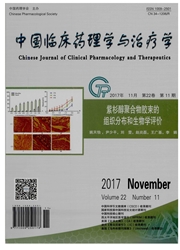

 中文摘要:
中文摘要:
熊脱氧胆酸(ursodeoxycholic acid,UDCA)具有"保肝作用",广泛应用于治疗各种慢性肝病,包括原发性胆汁性肝硬化(primary biliary cirrhosis,PBC)、原发性硬化性胆管炎(primary sclerosing cholangitis,PSC)、囊性纤维化(cystic fibrosis,CF)等,缺乏阳性药物对照,故对UDCA治疗慢性肝病的临床疗效机制尚不十分明确。近年来,由于UDCA不良事件报道日益增多,尤其在高剂量下,UDCA已表现出显著毒性。本文对UDCA在慢性肝病的临床应用及其机制进行探讨,为临床合理应用UDCA治疗肝病提供参考。
 英文摘要:
英文摘要:
Ursodeoxycholic acid (UDCA) has been widely used in clinical treatment of liver disease due to its hepato-protective effect,including primary biliary cirrhosis (PBC),primary sclerosing cholangitis (PSC) and cystic fibrosis (CF),etc.Lack of effective drug as control,UDCA's clinical effect and mechanism of action remain unclear.Recently,the reports about adverse events caused by UDCA,especially at high dosage have been increasing.This review summarizes the clinical application and mechanism of UDCA in treatment of liver diseases,which is referential for its clinical application.
 同期刊论文项目
同期刊论文项目
 同项目期刊论文
同项目期刊论文
 期刊信息
期刊信息
